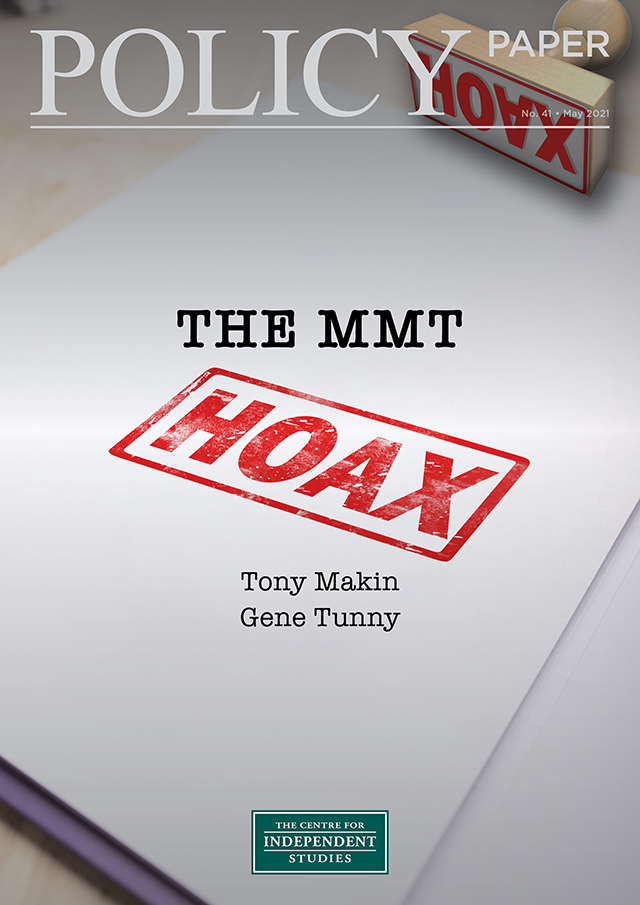The MMT Hoax
Home » Publications » The MMT Hoax
· PP41
Modern Monetary Theory (MMT) is a supposedly new macroeconomic paradigm, but it is essentially a reprise of 1930s Keynesian economics. Its central premise — that countries which can borrow in their own currencies should not worry about government deficits and can finance as much government spending as they want — is deeply flawed, yet it has political appeal and has found favour in the mainstream media.
This paper argues that the macroeconomic consequences of MMT would be disastrous. According to MMT, large budget deficits due to increased government spending and the monetisation of debt that arises as a result are not a problem. Yet, as the authors point out, both the size of government and public debt have long-term consequences in terms of bigger interest bills, higher taxes and lower future economic growth.
MMT also assumes governments can use fiscal policy to ‘fine tune’ the economy to stimulate demand and boost employment in times of macroeconomic distress like the COVID-19 crisis. But the historical record shows that such fiscal policy activism risks leading to runaway inflation.
The authors conclude that MMT is essentially a political doctrine: it recommends increased government spending to stimulate economies, rather than tax cuts, and recommends tax hikes to pull money out of the economy and control inflation during booms. The political economy of MMT thus suggests it is conducive to ever-expanding government.
In recent years, so-called Modern Monetary Theory (MMT) has been reported in the mainstream media as an alternative approach to conducting macroeconomic policy. MMT’s sway derives mainly from newspaper and online articles where its facile policy prescriptions have attracted the attention of journalists and commentators. Its emergence as a supposedly new macroeconomic paradigm has not stemmed from an acceptance of its actual novelty or contribution in academic circles, where for many years it has largely been ignored as a fringe perspective. Indeed, the Chicago Booth Economics Experts Panel overwhelmingly disagreed with the central MMT propositions:
Economic history teaches us that sharply deteriorating macroeconomic conditions create a vacuum for alternative policy-oriented frameworks to emerge. This was true during The Great Depression and the high inflation era of the 1970s. To a much lesser degree it has been true of MMT, which has incubated in a distressed macroeconomic environment; the 2008-09 Global Financial Crisis (GFC) and its aftermath, and most recently due to the COVID-19 Crisis (the CVC).
Pre CVC, advanced economies had been experiencing significantly lower economic growth than prior to the GFC. Economic growth in most advanced economies had been weaker and unemployment higher than previously. The CVC then dealt a devastating blow to economies worldwide in 2020, causing deep recessions and big spikes in unemployment. Very low Inflation — often below central banks’ target levels — has persisted, while official interest rates have fallen close to zero. The macroeconomic response to the pandemic involved unprecedented fiscal and monetary support for businesses and households. Fiscal policy, in particular, assumed a far more prominent role than in the 1980s, 1990s and early 2000s, when short term macroeconomic management was largely the preserve of independent central banks.
In this context, MMT’s main point is that fiscal policy in the form of increased government spending should supplant monetary policy as the macroeconomic instrument for managing the economy to ensure full employment; not only during crisis periods like the GFC and CVC, but all the time. Following the spirit, indeed the letter, of John Maynard Keynes’ celebrated Depression-era work The General Theory of Employment, Interest and Money (1936), MMT’s central premise is that increased public spending — irrespective of its form, or productivity — should be the main policy instrument for boosting endemically sub-optimal aggregate demand to lower unemployment.
This paper evaluates the macroeconomic worth of MMT. The next section briefly assesses its claim to novelty with reference to the evolution of macroeconomic theory. We then examine the plausibility of the central propositions motivating MMT, notably its advocacy of activist fiscal policy, before concluding that adhering to the policy prescriptions of MMT would lead to disastrous macroeconomic consequences far worse than those it seeks to remedy.
Also by Tony Makin: A Fiscal Vaccine for COVID-19
Also by Gene Tunny: RATIONALISING REGULATION: Helping the economy recover from the corona crisis
SELECTED REFERENCES
Alesina, A. and Summers, L. (1993) “Central Bank Independence and Macroeconomic Performance: Some Comparative Evidence, Journal of Money, Credit, and Banking, 25(2), 151-62.
Book, J. (2021) “The Mystery of Modern Monetary Theory”, Economic Affairs, 41(1), 162-174.
Carling, R. (2021) The Looming Iceberg: Australia’s Post-Pandemic Debt Risk Policy Paper No 35, Centre for Independent Studies, Sydney.
Cusbert, T. (2017) “Estimating the NAIRU and the Unemployment Gap”, RBA Bulletin, June quarter 2017, 13-22.
Davidson, P. (1972) Money and the Real World Macmillan, London.
Fleming, J. (1962) “Domestic Financial Policies Under Fixed and Under Floating Exchange Rates”, IMF Staff Papers, 12, 369-80.
Friedman, M. (1968) “The Role of Monetary Policy.” American Economic Review, Vol. 58, 1 , 1–17.
Friedman, M. (1994) Money Mischief: Episodes in Monetary History, Houghton Mifflin Harcourt, Boston.
Friedman, M. and Schwartz, A.J. (1963) A Monetary History of the United States, 1867-1960, Princeton University Press, Princeton.
Hansen, AH (1939) “Economic progress and declining population growth”, American Economic Review, 29: 1-15.
International Monetary Fund (2021) Global Debt Database available at https://www.imf.org/external/datamapper/datasets/GDD
